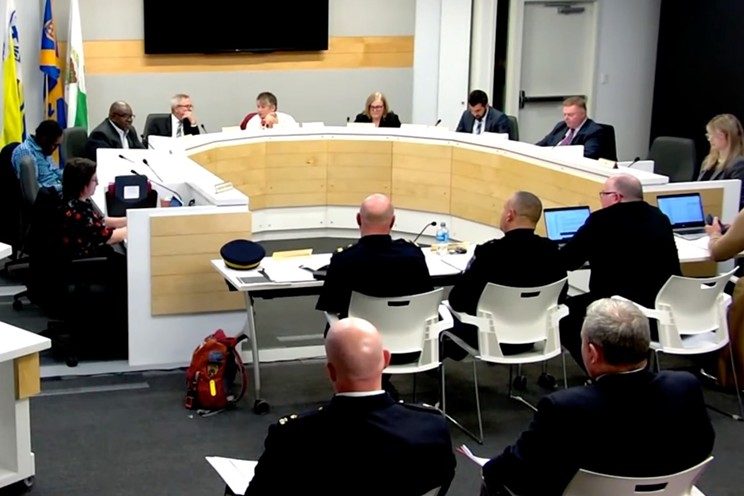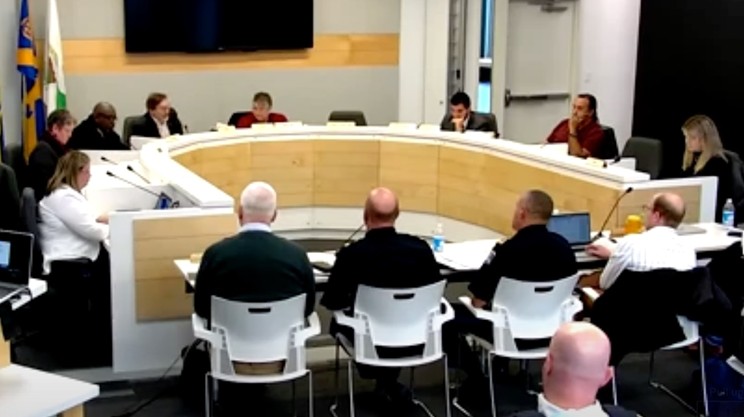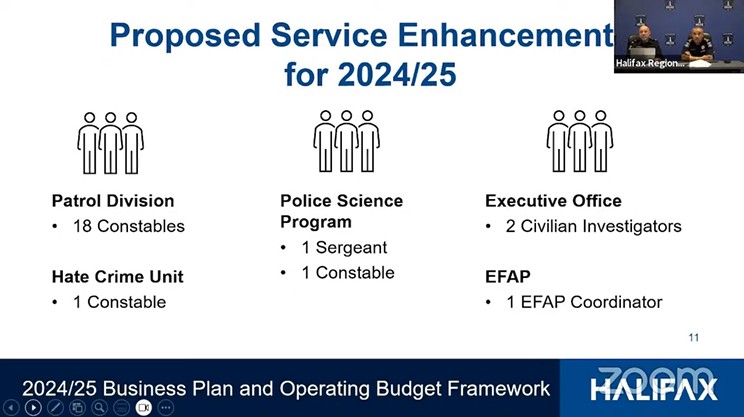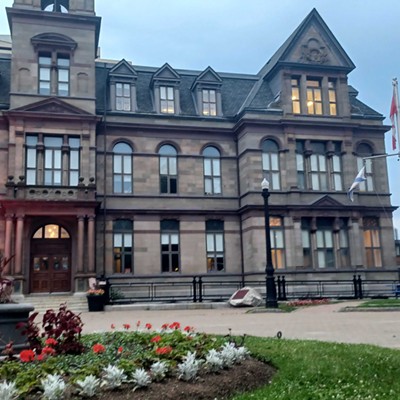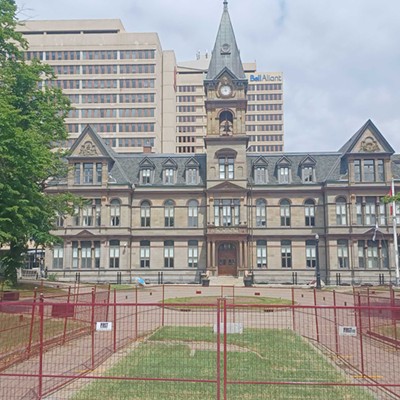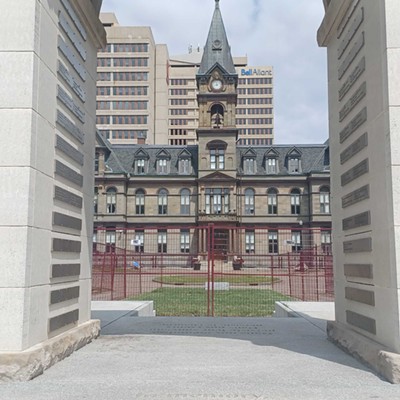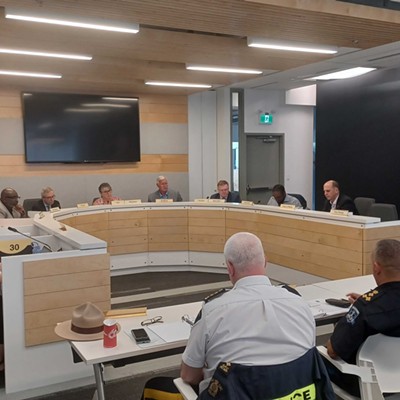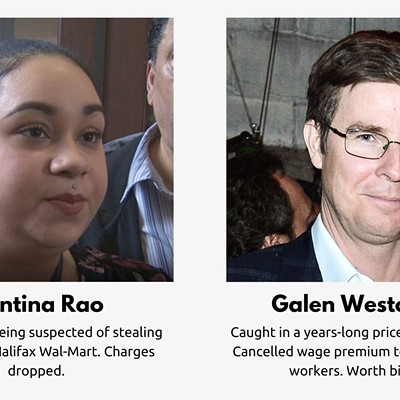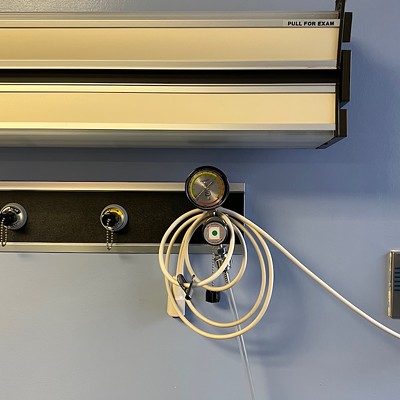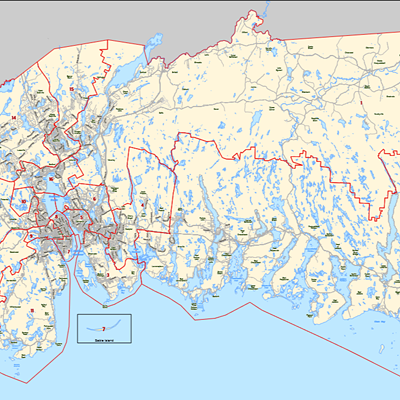The Board of Police Commissioners met on Wednesday and finally had their initial strategic budget meeting at the third time of asking. That is, three meetings into the police budget deliberation process and the Nov. 15 meeting was the first time the board got to actually see the Halifax Regional Police’s proposed 2024/25 budget rather than just hear a request for more officers. Like in the three previous meetings, the HRP are proposing an increase of $4,398,400 (4.8%) mainly for 24 new police hires.
But of those 24 hires, only about six could be considered in line with “the strategic priorities of the Board of Police Commissioners: Develop, Engage, Adapt and Evolve.” And so the HRP got lambasted for this ask by the police oversight board.
Commissioner Gavin Giles was first up, taking issue with the fact that police propagandized their proposed new hires as “service enhancements” in their presentation. Giles—a self-proclaimed “support your local police kind of guy”—took issue with the branding. He argued that the police always push for more boots on the ground, and more boots on the ground cost a lot of money. Money that could be going towards other things, like public safety measures that actually make us safer, instead of policing. Giles wanted an explanation as to why the HRP considered all of their hiring asks “service enhancements.”
Acting HRP chief Don MacLean was not really able to give an answer to Giles’ question because the police don’t really serve a well-defined purpose in society right now and are mainly coasting on inertia, soaking up municipal resources, catching an occasional “bad guy,” achieving no clear outcome for society beyond gesturing towards platitudes about fighting crime, protecting and serving. This information was given to the board last year by the RCMP when they submitted, as appendix E on another report, a 30-year study of police spending titled A 30 year analysis of police service delivery and costing: ‘E’ Division research summary, which demonstrates that police spending has gone up, but policing outcomes have not improved to match that spending. Which means, according to the RCMP, there’s no evidence to support new police hires being branded “service enhancements.”
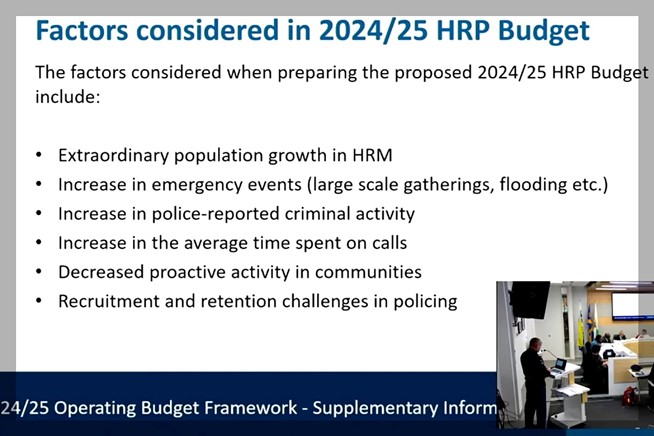
As we discussed after the last BOPC meeting, 12 of the 24 proposed hires are patrol officers; commissioner Yemi Akindoju talked about them, pointing out a more practical lack of long-term thinking in the police budget. The fact that a police force that gains about five officers a year also expects to lose over 100 officers in the next three years, but is only asking for 12 officers this year, suggests there needs to be a “structural correction” in police succession planning. He made the argument that it’s a lot more expensive to hire a specialist or veteran cop compared to keeping the ones we have or training up promising academy prospects. And although hiring an experienced veteran can feel like a sure thing, that has also been the Toronto Maple Leafs’ main strategy for winning Stanley Cups, and we all know how well that’s going.
During the HRP’s presentation, chief MacLean mentioned that some of the jobs they want to hire for are already being filled by patrol officers. Commissioner Harry Critchley wanted to know if that means the HRP actually need more than 12 patrol officers, and are banking on the 12 plus the newly freed-up officers? What Critchley was trying to figure out was how the HRP calculates the need for patrol officers. MacLean said there is a formula involving the number of officers and the population of the city—the cop-to-pop ratio—that some forces use, but that’s not really an adequate measuring stick. The HRM is coming up with its own calculation, but hasn’t quite finished that work.
The RCMP also made its budget ask at Wednesday’s meeting, an increase of $1,253,364 for seven new cops. Even though this money is technically paid by the province to the feds, the province can and will change the agreement with the feds if Halifax’s chief administrative officer writes a letter to the province promising to pay for the increase. The CAO will write that letter, provided the board recommends council endorses the request *and* if council subsequently directs the CAO to write the letter at the behest of the Board of Police Commissioners. Clear as mud?
Commissioner Critchley asked RCMP chief superintendent Jeff Christie if his request for two new cops for the intimate partner violence section was in fact a good idea. Critchley pointed out the Mass Casualty Commission found that good officers injected into a bad system create bad outcomes. And if the intimate partner violence section was systemically bad, wouldn’t two new cops just create unintentionally bad outcomes?
All of this discussion was around information items, and not actionable motions. Because of what’s supposed to happen next, and why this meeting should have happened three meetings ago.
In a functional democratic bureaucracy, what would happen next would be this: Taking the feedback given to them by their board, the HRP and RCMP would then sit down with the new municipal department of public safety being stood up, and align all of three of their budgets with municipal strategic objectives and the board’s feedback. The HRP should, in this hypothetical meeting, be able to answer Critchley’s questions about what the actual need for patrol officers is, and why they are needed. They would consider commissioner Giles’ feedback and the 30-year study on police spending about the ability of boots on the ground to achieve the city’s goals. They would look at the success of non-police interventions in other cities. Doing this type of table-top planning exercise would likely also conclude that the police would not need to hire as many patrol officers, as the city could get more public safety capabilities faster and cheaper with a civilian response force.
The police would then also consider the fact that the city of Halifax is growing, and shrinking the police budget is likely not in the cards. But what could police do if they managed to free up their on-call generalist budget? One of the police’s main roles in society is to be violent on our behalf, to protect us, when nessesary. But when it was last necessary in Nova Scotia the police seriously botched the job. And after the fact, the members of the RCMP’s Emergency Response Team who ended up stopping the mass shooter were treated horribly. Knowing that this is a role that police will always have to play in society, taking into consideration the lessons from the MCC, and the feedback from commissioner Yakindoju about making lives better for existing members to ease the recruitment burden of the upcoming gray wave, it would make sense for the RCMP and HRP to let public safety take the non-police roles and responsibilities of front line patrol officers. This would mean less of a patrol burden for police. Which in turn would mean members of the ERT—the city’s police unit with specialized training in violence—don’t have to spend time waiting in ERs responding to non-emergency calls.
But before that type of table-top planning can happen, the board and police still need to hear again from the public next Wednesday, November 22. Then between Nov. 22 and Nov. 28 the police and public safety should align their budget plans with the other public safety departments, with the various reports, with the city’s strategic plans, with the board’s direction and with public input. And then on Nov. 29, 2023, the RCMP and HRP should present new budgets in line with all of those considerations and input.
As staff told council at Tuesday’s council meeting, this type of alignment work is happening already, which is why they felt forming a committee to implement the recommendations from the defunding the police report was unnecessary. So the only real question remains, are the city’s police forces up for the challenge of bringing policing into the 21st century? We will get that answer when we see what the next draft of the police budget look at November 29th’s meeting of the Board of Police Commissioners.

